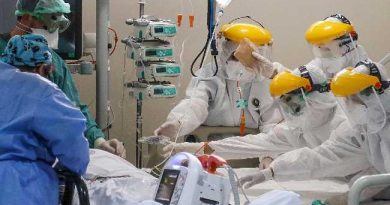Effects of Chernobyl Still Apparent on Turkish Black Sea Coast
 It has been 25 years since a disastrous explosion in Chernobyl nuclear power plant happened, yet its effects still continue to appear in the region, especially on the Black Sea coast of Turkey.
It has been 25 years since a disastrous explosion in Chernobyl nuclear power plant happened, yet its effects still continue to appear in the region, especially on the Black Sea coast of Turkey.
Twenty-five years after the incident, which happened on April 26, 1986, the exact number of people who lost their lives through the radiation they were exposed to is still unknown, yet the number of cancer incidents in the region is not at all to be underestimated.
“I have lost seven people in my family due to cancer,” said Meral Kara, who lives in Trabzon. “My husband, my mother and my two sons, who were very young, died of cancer. And now I wait; when is my turn?”
“It is true that there are many cases of cancer around here,” Yalçın Emiralioğlu, the mayor of Kemalpaşa, a small town in Artvin province with high rates of cancer, recently told the Hürriyet Daily News & Economic Review. “I also have lost my relatives to cancer.”
No radiation in the tea
When the explosion took place at Chernobyl, then part of the former USSR and now part of Ukraine, Turkish government officials denied that radioactivity coming from Chernobyl would affect the natural habitat in Turkey.
Cahit Aral, then the minister of industry and trade, was one of the government members who said there was no radiation in Turkish agricultural products, especially black tea, which is grown in the Black Sea region. In order to prove his point, Aral drank tea in front of journalists and said: “Believe it like you believe in your religion, there is no radiation in the tea. It is harmless.” Minister of Environment Doğan Akyürek also seconded Aral, by rubbing tea on his face.
In 1987, the Turkish Atomic Energy Authority, or TAEK, also announced that the amount of radiation found in tea was harmless.
Yet, according to Professor İnci Gökmen from Middle East Technical University’s Department of Chemistry, a considerable amount of radiation was detected in the teas produced in the Black Sea region. The teas were not pulled from the market.
“We analyzed the teas and detected 10,000 Becquerel rays per kilogram. That is a very high number,” Gökmen told the Daily News. “Still those teas were not pulled from the market. Those teas exposed thousands of people to high radiation.”
Death tolls
Although the Turkish Health Ministry has not confirmed that Chernobyl has increased cancer cases in Turkey, according to a 2006 report by Turkish Chamber of Physicians, 47.9 percent of deaths in the Black Sea region are caused by cancer.
“I worked in a remote village in Rize between 1988 and 1990,” Dr. Kayahan Pala, director of the report, told the Daily News. “I can say that we saw a rise in abnormal births those years. We saw babies born without arms and legs. I can also say that there was a major rise in cancer cases too.”
Still, Pala said it was not possible to prove a direct link between Chernobyl and Turkey since many Turkish hospitals did not have past death records.
“I do believe that there is a direct effect, but we don’t have any means to prove it. We know that even in Norway and other Scandinavian countries, people were affected by this disease, and Turkey definitely got affected too,” Pala said.
But many government officials do not agree. Last year, Parliament’s Cancer Research Committee also prepared a report, which concluded that cancer cases in the Black Sea region had not increased at all.
“We worked with officials from TAEK, the Ministry of Health and NGOs,” Kemalettin Aydın, Parliament deputy and head of the Cancer Research Committee, told the Daily News. “If you compare the region to other parts of Turkey, you will see that there is no increase.”
Civil initiatives
While the government reports do not acknowledge a cancer risk, there are civil initiatives in the Black Sea region which try to educate the public about the risks of cancer.
Lawyer Sibel Suiçmez is the head of the Cancer Patients Solidarity Platform in Trabzon.
“Whatever they say, almost every family here has a cancer patient, or has a baby with an anomaly,” Suiçmez told the Daily News. “Nobody here believes the government reports. It is as if they are joking with us. I really don’t understand why the government is so insistent on hiding this fact. But people know what they are experiencing.”
As a lawyer, Suiçmez said she did not think it would be an option to start a court case against those who are responsible. “I think that is one reason why there are no reports on the increase of cancer cases. Turkish officials don’t want to be responsible.”
The case of Kazım Koyuncu
Although the Chernobyl disaster is said to have taken many lives, perhaps the most well-known case was the death of 34-year-old musician and folk singer Kazım Koyuncu, who died in 2005.
Koyuncu recorded his songs in a number of languages spoken along the northeastern Black Sea coast of Turkey, including Lazuri (spoken by the Laz people), Georgian and Armenian. He was also a well-known leftist and activist on environmental and cultural issues and was against the construction of a nuclear reactor in Sinop.
Nuclear power plants in Turkey
Turkey currently does not produce nuclear power, but there are two agreements which are expected to start soon.
Turkey’s first power plant will be in Akkuyu, a town on the Mediterranean coast. The plant will be built, owned and operated by a Russian subsidiary of Rosatom, a state-owned nuclear company.
The other plant will be built in Sinop, a city on the northern coast of the Black Sea. Prime Minister Recep Tayyip Erdoğan recently announced that the construction for both plants would start very soon.
March 18, 2011
SOURCE: Hürriyet Daily News





